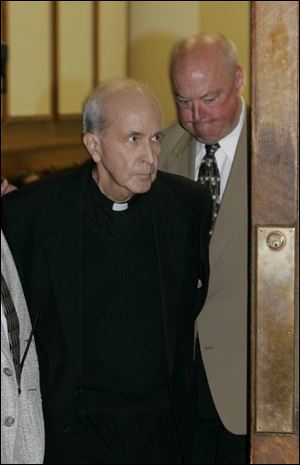
Convicted priest's legal woes aren't over
5/14/2006
Robinson
The murder trial of Roman Catholic priest Gerald Robinson ended with a dramatic conviction Thursday, but the verdict did not mark the end of legal proceedings for the retired Toledo cleric.
As Robinson sits in Lucas County jail awaiting transfer to an Ohio prison, a civil lawsuit against the 68-year-old priest is scheduled for a pretrial conference June 5 before Lucas County Common Pleas Judge Ruth Ann Franks.
A Toledo-area woman in her 40s, who filed anonymously as Jane Doe with her husband as co-plaintiff Spouse Doe, alleges in the suit that she was raped and tortured in ritual abuse by Robinson when she was a young girl.
The civil suit also names the Toledo Catholic Diocese as a defendant.
John Callahan, an attorney representing Robinson in the civil suit, yesterday declined to comment on the specifics of the allegations.
Meanwhile, Lucas County Prosecutor Julia Bates said she has not ruled out the possibility of filing obstruction of justice charges against the Toledo diocese for not turning over documents the state requested 2 1/2 years ago during its murder investigation of Robinson.
"I am not anticipating it, but I will never say never," Mrs. Bates said.
Robinson's conviction in the 1980 ritualistic killing of 71-year-old Sister Margaret Ann Pahl is likely to be a factor in his civil trial, according to Mrs.
Bates and several attorneys interviewed by The Blade.
Unlike criminal trials, defendants in civil court can be compelled to testify. They have the right not to respond, but in civil cases such a refusal can be held against them, the legal experts said.
"The theory is one of credibility issues," Mrs. Bates said. "If a defendant has a record involving crimes of moral turpitude, such as lying, cheating, or stealing, then they could be viewed in court as not necessarily being credible."
For Robinson, being convicted of murdering a nun "might be a problem for him in a civil case," she said.
Jeff Anderson, a Minnesota attorney who has filed more than 1,000 lawsuits against the Catholic Church, said yesterday that the ritual aspects of the murder case could help the plaintiffs' claims of ritual abuse.
The civil suit alleges that between 1968 and 1975, starting when Jane Doe was 5 and continuing through age 13, Robinson and others forced her to perform sexual acts and made her drink animal blood, "chanted satanic verses," and drew an upside down cross on her stomach in rituals held in the basement of St. Adalbert Catholic Church and in unspecified wooded areas.
"Evidence related to the ritualistic stuff in the criminal case will be very helpful in the civil case," Mr. Anderson said.
Mr. Callahan agreed that Robinson's murder conviction "will be available" in the civil case.
Mark Davis, the Doe couple's attorney, did not return calls seeking comment Friday or yesterday.
If Robinson refuses to answer questions in the civil suit, Judge Franks could hold him in contempt of court.
"The sanctions would be potentially some kind of confinement," said Dean Mandros, a Lucas County assistant prosecutor.
But with Robinson already sentenced to 15 years to life in prison, those sanctions "would be meaningless," he said.
Although jail time is not a major issue in the civil case, there is still a lot at stake: money.
"In a civil suit, you're not going for punishment, you're going for money," Mrs. Bates said. "You don't win incarceration, you win dinero."
Jane Doe and her husband are seeking "compensatory damages in excess of $25,000" from Robinson and his co-defendants.
The priest's home on Nebraska Avenue and any other assets he may own could be in jeopardy, Mrs. Bates said.
Also facing possible financial penalties would be the Toledo diocese, which the suit claims had knowledge of Robinson's alleged offenses and conspired to keep them secret.
"They're trying to get to the deep pockets," Mrs. Bates said.
The diocese settled two dozen civil suits in 2004 alleging clerical sexual abuse, paying $1.19 million to 23 victims.
After the nationwide clerical sexual abuse scandal erupted in 2002, the Lucas County Prosecutor's Office and the Toledo diocese signed a pact pledging cooperation.
Mrs. Bates and then-Bishop James Hoffman, who died in February, 2003, signed the agreement in August, 2002, in which the diocese promised to "provide the prosecutor with information regarding allegations involving a priest" and all other employees.
But when the prosecutor's office asked the diocese on Dec. 15, 2003, for all of its files on Robinson, the diocese provided just three pages of minimal information.
Prosecutors returned to the Catholic Center in downtown Toledo in September, 2004, armed with a search warrant and seized 145 more pages from Robinson's files.
"Could you make an argument that they were less than cooperative? You could make that argument," Mrs. Bates said.
But having to file a search warrant to obtain information does not necessarily mean that prosecutors will file obstruction charges, she added.
She said charging the diocese with obstruction of justice would not be the preferred course of action.
"I would just like to get on a better footing with the diocese so we can work together," Mrs. Bates said.
Contact David Yonke at:
dyonke@theblade.com
or 419-724-6154.